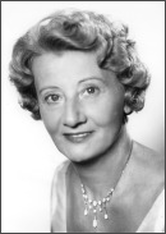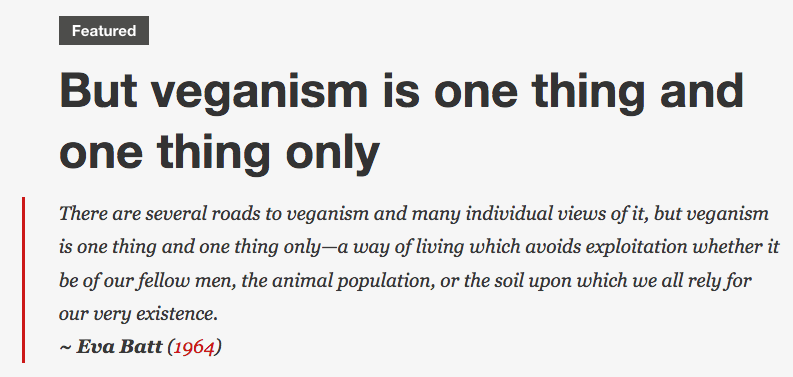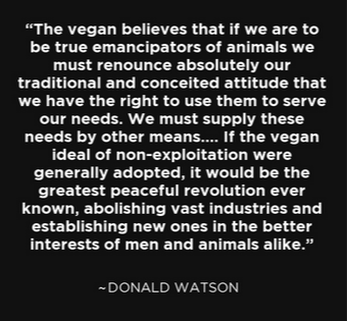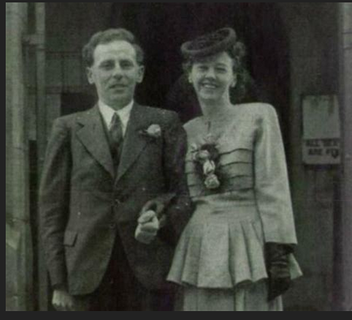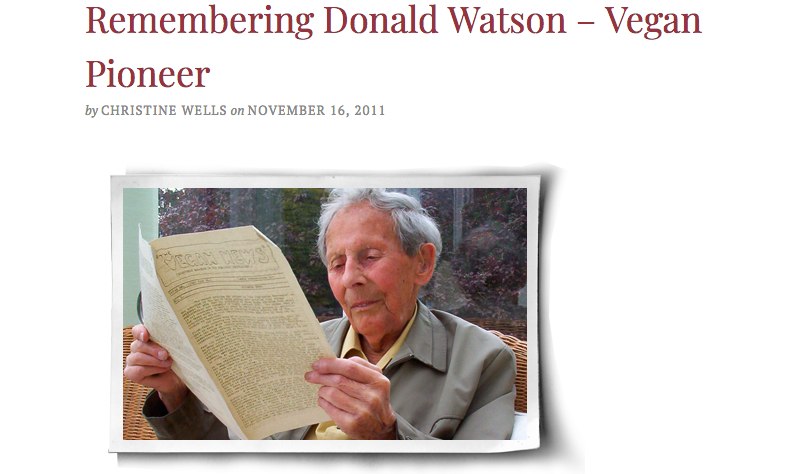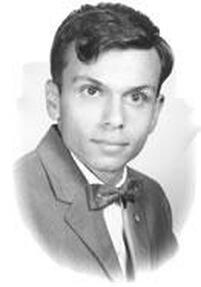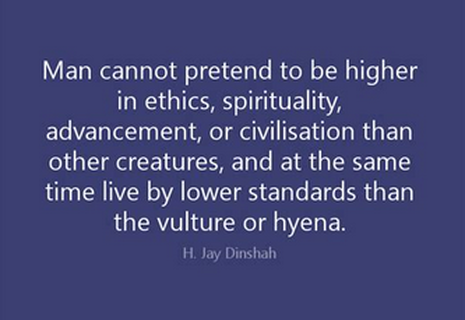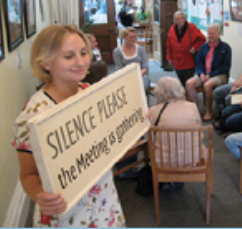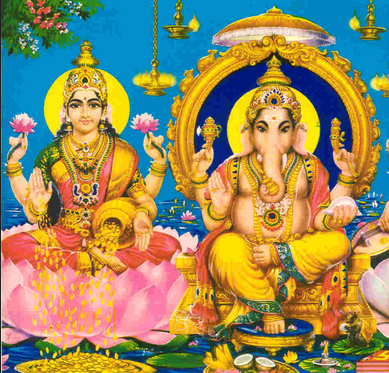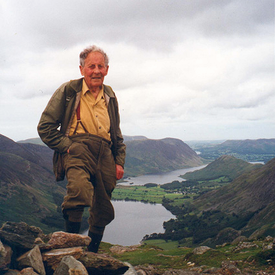 Donald Watson -- one of the first vegans
Donald Watson -- one of the first vegans Do you know how the vegan
movement began?
For those who coined the word in 1944 and those who joined these revolutionaries long before most of the world had ever heard the word, “vegan,” veganism embodied the broad themes that universally underlie the major world religions.
Fundamentally, veganism was and is about self-growth on a path that seeks justice and gives guidance as to how to live a good life. In this way, veganism connects us with something larger than ourselves.
However, unlike religions and atheism, veganism does not require one to believe in a deity – nor does it preclude one from doing so. You can be deeply religious, agnostic or atheist and also be a dedicated vegan. And...
movement began?
For those who coined the word in 1944 and those who joined these revolutionaries long before most of the world had ever heard the word, “vegan,” veganism embodied the broad themes that universally underlie the major world religions.
Fundamentally, veganism was and is about self-growth on a path that seeks justice and gives guidance as to how to live a good life. In this way, veganism connects us with something larger than ourselves.
However, unlike religions and atheism, veganism does not require one to believe in a deity – nor does it preclude one from doing so. You can be deeply religious, agnostic or atheist and also be a dedicated vegan. And...
Similar to the highest aspirations of world religions (and some ethical atheistic traditions) veganism asks adherents to be self-reflective and grow in their maturity and will to do, “What they believe is right.” For vegans, the central belief about “what is right” is that custom, tradition and pleasure are not justifications to intentionally harm other beings.
Because we live in a culture with longstanding customs, traditions and pleasures built upon the exploitation of non-human animals, most of us have been indoctrinated into a perspective (supported by habits) that blinds us to injustices against non-humans. Veganism seeks to address the most widely ignored, systematically promoted injustice on the planet today—speciesism. Like other “isms,” speciesism gets passed along culturally. It is facilitated by our innate desire to fit in and not rock the boat. Like other isms, speciesism can be overcome by a combination of critical thinking and empathy.
Because we live in a culture with longstanding customs, traditions and pleasures built upon the exploitation of non-human animals, most of us have been indoctrinated into a perspective (supported by habits) that blinds us to injustices against non-humans. Veganism seeks to address the most widely ignored, systematically promoted injustice on the planet today—speciesism. Like other “isms,” speciesism gets passed along culturally. It is facilitated by our innate desire to fit in and not rock the boat. Like other isms, speciesism can be overcome by a combination of critical thinking and empathy.
However as it has grown, people are embracing veganism without knowing its larger historical context. Missing this important piece (and peace!) deprives us of the greatest gift that veganism has to offer our challenged world.
Before the word vegan was coined in 1944, there were networks of vegetarians who eschewed milk, eggs, honey wool and leather for the very same reasons they avoided meat. The Filmores, who founded Unity Church, were one example of this and went to great lengths to print the first Unity bibles and bind them using an animal-free alternative to leather.
As vegetarianism became more popular and its health advantages became known, it drew many for reasons besides justice and non-violence. Hitler’s supposed vegetarianism is an example. Though an interview with Hitler's personal chef reveals he was not really vegetarian, but rather pretending to be to convince the public he was a dedicated leader willing to forego personal pleasure for a disciplined life, it highlights why a new word was needed.
So in the early 1940s a small group of vegetarians created this new word, “Vegan.” Though Donald Watson’s wife Dorothy appears to have been the person who suggested this new word, Donald is the one most often credited with its coinage.
Before the word vegan was coined in 1944, there were networks of vegetarians who eschewed milk, eggs, honey wool and leather for the very same reasons they avoided meat. The Filmores, who founded Unity Church, were one example of this and went to great lengths to print the first Unity bibles and bind them using an animal-free alternative to leather.
As vegetarianism became more popular and its health advantages became known, it drew many for reasons besides justice and non-violence. Hitler’s supposed vegetarianism is an example. Though an interview with Hitler's personal chef reveals he was not really vegetarian, but rather pretending to be to convince the public he was a dedicated leader willing to forego personal pleasure for a disciplined life, it highlights why a new word was needed.
So in the early 1940s a small group of vegetarians created this new word, “Vegan.” Though Donald Watson’s wife Dorothy appears to have been the person who suggested this new word, Donald is the one most often credited with its coinage.
Perhaps that is because Donald wrote prolifically about veganism and his feeling that veganism would launch a revolution in human consciousness. For Watson, veganism was about not exploiting other beings. He clearly intended this new philosophy to be very holistic, incorporating health and environmental sustainability with social justice. Though Watson had been such a sickly child that he was not expected to live a long life, he lived to the age of 95 – with amazing functionality right up until his last year. Watson credited this not only to his veganism, but also to the fact that he avoided using any pharmaceuticals. Watson explained that he was never even vaccinated as a child, because his doctors thought vaccines would be too risky given his very fragile state and constitution.
A friend of mine visited Donald Watson a few years before he died and saw how vigorous he was – taking long daily hikes into the hills well into his nineties. Interviews with Watson at this time, suggest he still had excellent cognitive skills. Click on the image below these words to read another wonderful article about Watson:
Watson counted among his close friends, Leslie Cross who also published prolifically about the philosophy of veganism. Cross expounded upon the view shared by the earliest vegans, that one of the most important benefits of veganism was its impact upon the character of those who embraced it holistically.
Though the first self-identified vegans were in the UK, Veganism jumped the pond to America, mostly by the efforts of Jay and Freya Dinshah beginning with Jay becoming vegan in 1957 after visiting a slaughterhouse. From then on he dedicated his life to raising awareness. Jay spent years traveling the US to educate people about veganism and together with his wife, Freya, founded the American Vegan Society, which Freya still helps run today.
To recap: The early vegans, when writing about veganism, made it clear that this philosophy was about non-violence and non-exploitation, improving human character, and protecting the entire world. So it’s no wonder we see dedicated spiritual seekers from every major religious tradition embracing veganism in growing numbers
(click on any of these images to see what that religion has to say about veganism)
Anyone who honestly seeks to live as consistent as possible with the core values common to all the major religions – to do unto others, to take care of our health, to protect creation, to be kind, and to help the less fortunate, eventually comes to appreciate that veganism is more consistent with all of these than continuing to exploit animals when it’s not necessary to our survival, especially since a growing body of science suggests that NOT being vegan is fundamentally driving the biggest threats to long term human survival.
